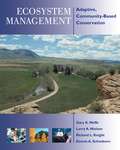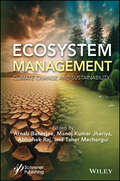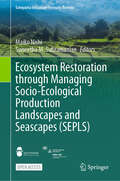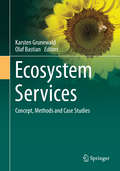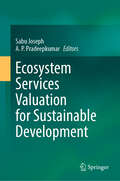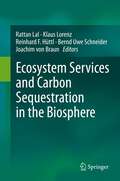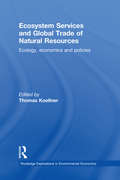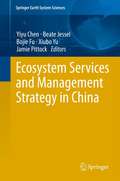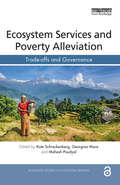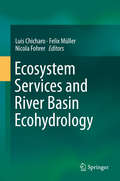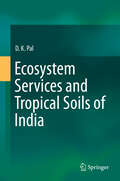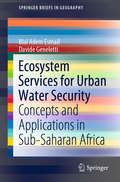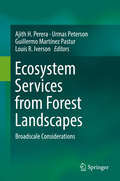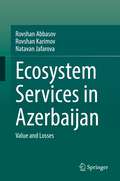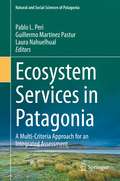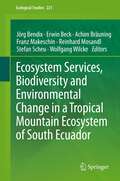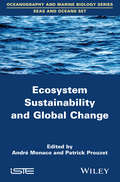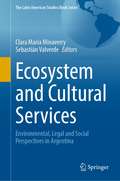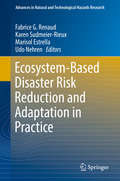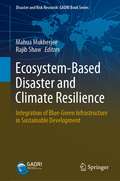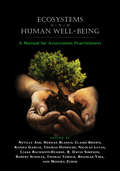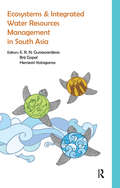- Table View
- List View
Ecosystem Management: Adaptive, Community-Based Conservation
by Richard L. Knight Gary Meffe Dennis Schenborn Larry NielsenToday's natural resource managers must be able to navigate among the complicated interactions and conflicting interests of diverse stakeholders and decisionmakers. Technical and scientific knowledge, though necessary, are not sufficient. Science is merely one component in a multifaceted world of decision making. And while the demands of resource management have changed greatly, natural resource education and textbooks have not. Until now. Ecosystem Management represents a different kind of textbook for a different kind of course. It offers a new and exciting approach that engages students in active problem solving by using detailed landscape scenarios that reflect the complex issues and conflicting interests that face today's resource managers and scientists. Focusing on the application of the sciences of ecology and conservation biology to real-world concerns, it emphasizes the intricate ecological, socioeconomic, and institutional matrix in which natural resource management functions, and illustrates how to be more effective in that challenging arena. Each chapter is rich with exercises to help facilitate problem-based learning. The main text is supplemented by boxes and figures that provide examples, perspectives, definitions, summaries, and learning tools, along with a variety of essays written by practitioners with on-the-ground experience in applying the principles of ecosystem management. Accompanying the textbook is an instructor's manual that provides a detailed overview of the book and specific guidance on designing a course around it. Ecosystem Management grew out of a training course developed and presented by the authors for the U.S. Fish and Wildlife Service at its National Training Center in Shepherdstown, West Virginia. In 20 offerings to more than 600 natural resource professionals, the authors learned a great deal about what is needed to function successfully as a professional resource manager. The book offers important insights and a unique perspective dervied from that invaluable experience.
Ecosystem Management: Climate Change and Sustainability
by Manoj Kumar Jhariya Arnab Banerjee Abhishek Raj Taher MecherguiThis book is essential for anyone who wants to understand the challenges of environmental degradation and learn about the sustainable solutions needed to address these critical issues. Today, the entire globe is suffering from various forms of environmental degradation, resource depletion, and an imbalance of natural phenomena. In this context, one of the major issues is loss of ecosystem services and proper functioning of natural ecosystems. Pollution, ecological invasion, loss of biodiversity, land degradation, and loss of productivity across various ecosystems have become the biggest challenges humankind is faced with. Considering Sustainable Development Goals 2030, the major target is to restore degraded ecosystems and their functionality, which will bring back the valuable ecosystem services of a diverse ecosystem. Ecosystem Management: Climate Change and Sustainability addresses all these issues to teach a global readership the dimensions of ecosystem services and ways toward a future sustainable world.
Ecosystem Restoration through Managing Socio-Ecological Production Landscapes and Seascapes (Satoyama Initiative Thematic Review)
by Maiko Nishi Suneetha M. SubramanianThis open access book is a compilation of case studies that provide useful knowledge and lessons that derive from on-the-ground activities and contribute to policy recommendations, focusing on the relevance of social-ecological production landscapes and seascapes (SEPLS) to ecosystem restoration. Building on the concept of SEPLS, the Satoyama Initiative promotes landscape approaches as integrative area-based strategies to bring together diverse stakeholders aiming to balance multiple objectives, including conservation and development, for the benefit of biodiversity and human well-being. Many of the SEPLS case studies from the International Partnership for the Satoyama Initiative (IPSI) offer rich evidence to help guide restoration efforts while advancing relevant knowledge and practices. The book highlights how the efforts in managing SEPLS can contribute to ecosystem restoration and sustainable development, looking at the strategies and approaches by which multiple stakeholders express, negotiate, and embrace their plural value perspectives of nature to restore ecosystems within a landscape or seascape. It begins with an introductory chapter followed by twelve case studies and a synthesis clarifying the relevance of the case study findings to policy and academic discussions. This book will be of interest to scholars, policymakers and professionals in the field related to sustainable development, especially on SDGs 15 and 17.
Ecosystem Restoration: Investigation Notebook
by The Lawrence Hall of ScienceNIMAC-sourced textbook
Ecosystem Services
by Pieter J. H. van Beukering Jetske A. BoumaDespite the growing popularity of the concept of ecosystem services, policy makers and practitioners continue to struggle with the challenge of translating it into practice. Drawing on a range of interdisciplinary perspectives, this volume takes up the challenge to provide a framework for the effective implementation of simple concepts into complex ecosystem-related decision-making. Addressing the measurement, valuation and governance of ecosystem services, the book is specifically designed to guide students and policy-makers from definitions and measurements to applications in terms of policy instruments and governance arrangements. Each chapter discusses key methodological approaches, illustrating their applications at various scales by drawing on case studies from around the world. Presenting a range of perspectives from across many fields, this text ultimately considers the crucial question of how ecosystem service delivery can be safeguarded for generations to come.
Ecosystem Services - Concept, Methods and Case Studies
by Karsten Grunewald Olaf BastianNature provides us with many services seemingly for free: recharged groundwater, fertile soil and plant biomass created by photosynthesis. We human beings draw extensive benefits from these "ecosystem services," or ES - food, water supply, recreation and protection from natural hazards. Major international studies, such as the Millennium Ecosystem Assessment, have addressed the enormous role of biodiversity and ecosystems to human well-being, and they draw particular attention to the consequences resulting from the reduction or loss of these services. These very topical issues are being addressed by authors/scientists in a wide variety of disciplines - and their approaches, terminologies and methodological specifics are just as diverse. What, for example, does the efficacy of nature or natural capital mean? Which values of nature are particularly important, how are they distributed in space and time and how can they be assessed and the relevant knowledge promoted? Can all ecosystem services be quantified and even monetarised? What should be done to ensure that the multiple services of nature will be available also in future? This book explains the multifaceted concept of ecosystem services, provides a methodological framework for its analysis and assessment, and discusses case examples, particularly from Germany. It is addressed to scientists and practitioners in the administrative, volunteer and professional spheres, especially those who deal with environment, landscape management and nature conservation and regional and land-use planning. The target group includes experts from the business community, politicians and decision makers, students and all those interested in fundamental ecological, economic, ethical and environmental issues.
Ecosystem Services Valuation for Sustainable Development
by Sabu Joseph A. P. PradeepkumarThis book discusses state-of-the-art techniques for ecosystem service valuation of forests, rivers, wetlands, lakes and coastal ecosystems, for their sustainable development and management. An ecosystem service valuation can be used to address environmental degradation of natural resources. Numerous natural and man-made factors like climate change, pollution, encroachment, and over-exploitation, have put ecosystems under threat worldwide. These ecosystems provide a lot of services to human beings but many of these services are not taken into account in the market prices for products and services, and their ecological functions are not economically valued. The valuation of these ecosystems' services will help to shed light on their sustainable management. This book offers a fresh and innovative resource that captures the latest advancements, addresses emerging challenges, and propels the field forward, making it a must-have for researchers, practitioners, and policymakers. This book is also useful for stakeholders to achieve United Nations' Sustainable Development Goals 6 (Sustainability of water resources) and 13 (Climate action). The most relevant target audiences are hydrologists, hydrogeologists, environmental scientists, ecologists, biologists, and academicians. This book can be useful to post-graduate students, researchers, academicians, policy makers, NGOs in these fields. It also appeals to professionals in the fields of urban planning, agriculture, forestry, water resources management and environmental policy.
Ecosystem Services and Carbon Sequestration in the Biosphere
by Klaus Lorenz Rattan Lal Joachim Von Braun Reinhard F. Hüttl Bernd Uwe SchneiderEcological functions and human wellbeing depend on ecosystem services. Among the ecosystem services are provisional (food, feed, fuel, fiber), regulating (carbon sequestration, waste recycling, water cleansing), cultural (aesthetic, recreational, spiritual), and supporting services (soil formation, photosynthesis, nutrient cycling). Many relationships of various degree exist among ecosystem services. Thus, land use and soil management to enhance biospheric carbon sinks for carbon sequestration requires a comprehensive understanding on the effects on ecosystem services. Payments for ecosystem services including carbon pricing must address the relationship between carbon sequestration and ecosystem services to minimize risks of overshoot, and promote sustainable use of land-based carbon sinks for human wellbeing.
Ecosystem Services and Global Trade of Natural Resources: Ecology, Economics and Policies (Routledge Explorations In Environmental Economics Ser. #32)
by Thomas KoellnerThe utilization of natural resources to satisfy worldwide growing consumption of goods and services has severe ecological consequences. Aside from the projected doubling of food consumption in the next fifty years, the growing trade of biofuels and other commodities is a global challenge as the economic activities in the primary sector (i.e. mining, fisheries, aquaculture, forestry and agriculture) can damage biodiversity and ecosystem services. This should be taken into account in the decision-making affecting the global value chains linking consumer, retailer, processor, and producer in the North and the South. To cover the topic of ecosystem services and global trade this book is organized into four major parts. Part 1 gives the theoretical framework from an ecological, economic and political perspectives. Part 2 explores how internationally traded biophysical commodities from agriculture, forestry and fisheries translates into a virtual flow of land, freshwater, and marine ecosystems. Part 3 describes how two widely used accounting tools (i.e., Life Cycle Assessment and Green National Accounts) deal with international aspects of ecosystem services, and Part 4 shows how instruments like labelling, bans, or payments for ecosystem services in the private and public sector can influence trade patterns and the management of ecosystem services. This collection is a valuable contribution to the global change science dealing with ecosystem services. It illustrates the consequences of international trade on global ecosystem services and provides an overview of accounting tools and of market-based policy instruments to address negative and positive externalities. The book is certainly innovative, because it brings together research findings from distinct disciplines especially Industrial Ecology and Ecosystem Sciences, as well as Environmental Economics and Political Science.
Ecosystem Services and Management Strategy in China
by Jamie Pittock Yiyu Chen Beate Jessel Bojie Fu Xiubo Yu"Ecosystem Services and Management Strategy in China" is a two-year international cooperation project that culminated from the China Council for International Cooperation on Environment and Development's Task Force on Ecosystem Services and Management. It combines case studies, scenario analysis, and stakeholder consultations that focus on Chinese forest, grassland and wetland ecosystems and assesses the economic and social benefits of sustainable ecosystems management. It also identifies better practices in ecosystem management from Chinese and international experience and recommends a more intensive integration of ecosystem services into decision-making processes. In November 2010, the Task Force presented five strategic policy proposals for the implementation of sustainable management for Chinese ecosystems. These proposals were extremely well-received by senior decision makers and have since been adopted by national government agencies. The book represents a valuable reference work for researchers and professionals working in related areas. Professor Yiyu Chen worked as president at the National Natural Science Foundation of China from 2004 to early 2013 and is Member of the Chinese Academy of Sciences. Professor Beate Jessel works as president at the Federal Agency for Nature Conservation, Germany. Professor Bojie Fu works at the Research Center of Eco-Environment Sciences, CAS and is Member of the Chinese Academy of Sciences. Professor Xiubo Yu works at the Institute of Geographic Sciences and Natural Resources Research, Chinese Academy of Sciences. Dr.Jamie Pittock is a Senior Lecturer at the Fenner School of Environment and Society, Australian National University, Australia.
Ecosystem Services and Poverty Alleviation: Trade-offs and Governance (Routledge Studies in Ecosystem Services)
by Kate Schreckenberg Georgina Mace Mahesh PoudyalUnderstanding how to sustain the services that ecosystems provide in support of human wellbeing is an active and growing research area. This book provides a state-of-the-art review of current thinking on the links between ecosystem services and poverty alleviation. In part it showcases the key findings of the Ecosystem Services for Poverty Alleviation (ESPA) programme, which has funded over 120 research projects in more than 50 countries since 2010. ESPA’s goal is to ensure that ecosystems are being sustainably managed in a way that contributes to poverty alleviation as well as to inclusive and sustainable growth. As governments across the world map how they will achieve the 17 ambitious Sustainable Development Goals, most of which have poverty alleviation, wellbeing and sustainable environmental management at their heart, ESPA’s findings have never been more timely and relevant. The book synthesises the headline messages and compelling evidence to address the questions at the heart of ecosystems and wellbeing research. The authors, all leading specialists, address the evolving framings and contexts for the work, review the impacts of ongoing drivers of change, present new ways to achieve sustainable wellbeing, equity, diversity, and resilience, and evaluate the potential contributions from conservation projects, payment schemes, and novel governance approaches across scales from local to national and international. The cross-cutting, thematic chapters challenge conventional wisdom in some areas, and validate new methods and approaches for sustainable development in others. The book will provide a rich and important reference source for advanced students, researchers and policy-makers in ecology, environmental studies, ecological economics and sustainable development. The Open Access version of this book, available at https://www.taylorfrancis.com/books/e/9780429016295, has been made available under a Creative Commons Attribution-Non Commercial-No Derivatives 4.0 license.
Ecosystem Services and River Basin Ecohydrology
by Luis Chicharo Felix Müller Nicola FohrerThis book provides an integrated analysis of the methodologies and main processes occurring at the entire river basin, from upstream until the coast, by merging the biological and hydrological processes with the social and economic components, thus providing an integrated framework for river basin management, integrating the ecohydrology approach with the ecosystem services concept.
Ecosystem Services and Tropical Soils of India
by D.K. PalThis book highlights ecosystem services of Indian tropical soils driven by soil properties. Soils are complex and important biomaterials and have an outstanding role in providing ecosystem services to mankind. The tropical soils have been traditionally and generally considered as either agriculturally poor or virtually useless by many. This book will discuss the difficulties encountered in managing Indian tropical soils in order to sustain their productivity. Some unique soil properties are yet to be linked explicitly to soil ecosystem services and soil care needs to be a constant research endeavour in the Indian tropical environment. This book highlights the new and unique soil knowledge base necessary to close the gap between food production and future population growth.
Ecosystem Services for Urban Water Security: Concepts and Applications in Sub-Saharan Africa (SpringerBriefs in Geography)
by Davide Geneletti Blal Adem EsmailThe book addresses the challenges of urban water security and adaptive management in Sub-Saharan Africa, exploring and interlinking novel concepts of ecosystems services, watershed investments, and boundary work. Specifically, the book’s goals are to (i) present a conceptual framework for the urban water sector from an ecosystem services perspective, highlighting the specificities of the Sub-Saharan context; (ii) develop an operational approach to designing and assessing the impacts of watershed investments, based on ecosystem services and boundary work; and (iii) test the approach through a case study in Asmara, Eritrea, and discuss the findings and lessons learned that can be applied in other contexts. Through a fully worked out case study, from identification of water challenges and opportunities to spatially explicit modelling, the book offers a sound and accessible, coverage of issues and proposed solutions to better operationalize ecosystem services, watershed investments and boundary work, to promote adaptive management, and achieve water security in the context of rapidly developing cities in Sub-Saharan Africa. The book is an effective tool for capacity building of diverse stakeholders on the urban water sector, including water managers, local and national policy-makers as well as a suitable resource for both undergraduate and post-graduate courses in planning and geography.
Ecosystem Services from Forest Landscapes: Broadscale Considerations
by Ajith H. Perera Urmas Peterson Guillermo Martínez Pastur Louis R. IversonOver the last two decades, the topic of forest ecosystem services has attracted the attention of researchers, land managers, and policy makers around the globe. The services rendered by forest ecosystems range from intrinsic to anthropocentric benefits that are typically grouped as provisioning, regulating, supporting, and cultural. The research efforts, assessments, and attempts to manage forest ecosystems for their sustained services are now widely published in scientific literature. This volume focuses on broad-scale aspects of forest ecosystem services, beyond individual stands to large landscapes. In doing so, it illustrates the conceptual and practical opportunities as well as challenges involved with planning for forest ecosystem services across landscapes, regions, and nations. The goal here is to broaden the scope of land use planning through the adoption of a landscape-scale approach. Even though this approach is complex and involves multiple ecological, social, cultural, economic, and political dimensions, the landscape perspective appears to offer the best opportunity for a sustained provision of forest ecosystem services.
Ecosystem Services in Azerbaijan: Value and Losses
by Rovshan Abbasov Rovshan Karimov Natavan JafarovaThis book aims to draw readers' attention to the benefits once present nature in Azerbaijan. Over the past hundred years, much of this has been lost because of the neglect of the intrinsic values of nature by both managers and local authorities, and the overuse of natural resources. For example, oil pollution and overfishing in the Caspian Sea have almost destroyed its fish and caviar resources. In this volume, the authors distinguish between the concepts of "gain" and "income" and show readers that short-term benefits based solely on monetary income deprive people and nature itself of long-term, lasting value. The book provides readers with real historical information, discusses the interactions between humans and nature, and shows, with real data and trends, the consequences of anthropogenic activity on natural resources in Azerbaijan. The authors cover fish, water, forest, mountain, and pasture ecosystems, draw attention to the impacts that pollution and other forms of environmental degradation have had on these resources, and the show the impact that resource depletion on people’s livelihoods. The book is intended primarily for managers, policymakers, students, and academics, and will be of interest to natural scientists, historians, and students of culture.
Ecosystem Services in Patagonia: A Multi-Criteria Approach for an Integrated Assessment (Natural and Social Sciences of Patagonia)
by Guillermo Martínez Pastur Pablo L. Peri Laura NahuelhualThis book aims to quantify and discuss how societies have directly and indirectly benefited from ecosystem services in Patagonia; not only in terms of provisioning and cultural services, but also regulating and supporting services. Patagonia, a region that stretches across two countries (ca. 10% in Chile and 90% in Argentina), is home to some of the most extensive wilderness areas on our planet. Natural grasslands comprise almost 30% of the Americas, including the Patagonian steppe, while Patagonian southern temperate forests are important for carbon sequestration and storage, play a pivotal role in water regulation, and have become widely recognized for their ecotourism value. However, profound changes are now underway that could affect key ecosystem functions and ultimately human well-being. In this context, one major challenge we face in Patagonia is that ecosystem services are often ignored in economic markets, government policies and land management practices. The book explores the synergies and trade-offs between conservation and economic development as natural landscapes and seascapes continue to degrade in Patagonia. Historically, economic markets have largely focused on the provisioning services (forest products, livestock) while neglecting the interdependent roles of regulating services (erosion and climate control), supporting services (nutrient cycling) and cultural services (recreation, local identity, tourism). Therefore, the present work focuses on ecosystem functions and ecosystem services, as well as on trends in biodiversity and the interactions between natural environments and land-use activities throughout Patagonia.
Ecosystem Services, Biodiversity and Environmental Change in a Tropical Mountain Ecosystem of South Ecuador
by Erwin Beck Reinhard Mosandl Achim Bräuning Franz Makeschin Jörg Bendix Stefan Scheu Wolfgang WilckeAn interdisciplinary research unit consisting of 30 teams in the natural, economic and social sciences analyzed biodiversity and ecosystem services of a mountain rainforest ecosystem in the hotspot of the tropical Andes, with special reference to past, current and future environmental changes. The group assessed ecosystem services using data from ecological field and scenario-driven model experiments, and with the help of comparative field surveys of the natural forest and its anthropogenic replacement system for agriculture. The book offers insights into the impacts of environmental change on various service categories mentioned in the Millennium Ecosystem Assessment (2005): cultural, regulating, supporting and provisioning ecosystem services. Examples focus on biodiversity of plants and animals including trophic networks, and abiotic/biotic parameters such as soils, regional climate, water, nutrient and sediment cycles. The types of threats considered include land use and climate changes, as well as atmospheric fertilization. In terms of regulating and provisioning services, the emphasis is primarily on water regulation and supply as well as climate regulation and carbon sequestration. With regard to provisioning services, the synthesis of the book provides science-based recommendations for a sustainable land use portfolio including several options such as forestry, pasture management and the practices of indigenous peoples. In closing, the authors show how they integrated the local society by pursuing capacity building in compliance with the CBD-ABS (Convention on Biological Diversity - Access and Benefit Sharing), in the form of education and knowledge transfer for application.
Ecosystem Services: Economics and Policy (Palgrave Studies in Natural Resource Management)
by Stephen MuddimanThis book bridges the gap between economic and ecological theory and practice. Its main focus is on how the principles of the Austrian School of economics could improve the validity of Ecosystem Services.The concept of ‘Ecosystem Services’ is a relatively recent innovation in environmental thought. The current system is dependent upon mainstream economic theory, in which monetary and fiscal policy controls the prevailing health of the economy. The dependence on this approach to finance, Muddiman argues, limits the potential of ecosystem services and exacerbates the effects of the existing flawed economic model. The book highlights the links between ecological and economic methodologies and concepts and outlines how the principles of Austrian Economic theory could provide better environmental outcomes. It then goes on to formulate approaches to ecosystem services which could act as drivers towards a new biodiversity-based economic framework built around distributed ledger technology, or ‘blockchain’. The key distinction of this book is its consideration of ecosystem services as a function of the current economic system. Using this as a starting point it investigates how an alternative economic model would achieve the integration of environmental considerations into economic decision making.
Ecosystem Sustainability and Global Change
by Patrick Prouzet André MonacoThis volume provides various examples and dimensions, chemical, biological, climatic, or related to extreme (hazards). It describes, by reciprocity, the vulnerability of ecosystems, resources, heritage, human health and, consequently, economic and social sectors. it considers climate scenarios and socio-economic status indicators research, design strategies and patterns of adaptation, development of innovative monitoring systems, analysis of perceptions of major hazards and valuation of ecosystem services.
Ecosystem and Cultural Services: Environmental, Legal and Social Perspectives in Argentina (The Latin American Studies Book Series)
by Clara María Minaverry Sebastián ValverdeThis book describes cases and experiences in connection with environmental and cultural ecosystem services in Argentina. It contributes to the debate in connection with different approaches to analyse ecosystem services, focusing on the environment, the Law and social perspectives and concerns. Among the topics discussed are the implementation of the National Forests Act, the regulation and recognition of ecosystem services, the role of indigenous people, the policies in place for nature and forest conservation in different regions of Argentina. This book is one of the few research studies about cultural ecosystem services developed in Latin America and presents an attractive combination of the legal, environmental and social approaches and was written by an interdisciplinary team of academics who have theoretical and practical experience in this region where there is a valuable natural and cultural heritage.
Ecosystem-Based Disaster Risk Reduction and Adaptation in Practice
by Fabrice G. Renaud Karen Sudmeier-Rieux Marisol Estrella Udo NehrenThis book is a compilation of recent developments in the field of ecosystem-based disaster risk reduction and climate change adaption (Eco-DRR/CCA) globally. It provides further evidence that ecosystem-based approaches make economic sense, and showcases how research has progressively filled knowledge gaps about translating this concept into practice. It presents a number of methods, and tools that illustrate how Eco-DRR/CCA has been applied for various ecosystems and hazard contexts around the world. It also discusses how innovative institutional arrangements and policies are shaping the field of Eco-DRR/CCA. The book is of relevance to scientists, practitioners, policy-makers and students in the field of ecosystem management for disaster risk reduction and climate change adaptation.
Ecosystem-Based Disaster and Climate Resilience: Integration of Blue-Green Infrastructure in Sustainable Development (Disaster and Risk Research: GADRI Book Series)
by Rajib Shaw Mahua MukherjeeThis book provides an introduction to the critical role of ecosystem-based disaster risk resilience (Eco-DRR) for building community resilience to multiple environmental risks such as rising heat, water stress, and pollution. Blue-green infrastructure (BGI) is an Eco-DRR tool that is an under-explored paradigm and can respond as one common strategy to targets set by the Sustainable Development Goals (UNDP), Climate Agreements (UNEP), the Sendai Framework (UNISDR), and the New Urban Agenda (UNCHS). Highlighted here in a systematic way is the importance of blue-green infrastructures in resilience building. The purpose is to introduce readers to the challenging context of development and opportunity creation for Eco-DRR. The roles of policy, scientific research, and implementation are presented cohesively. An attractive proposition of the book is a collection of case studies from different parts of the world where integration of BGI is experimented with at various levels of success. It envisages that shared tacit experiences from the realm of practice will further strengthen explicit knowledge. The focus in this book is on need and context building, policy and science (investigation, analysis, and design), case studies, and a road map for the future in four successive parts. Each part is self-sufficient yet linked to its predecessor, successor, or both, as the case may be.
Ecosystems and Human Well-Being: A Manual for Assessment Practitioners (Five Volume Set Ser.)
by Thomas Tomich Monika Zurek Neville Ash Hernán Blanco Keisha Garcia Bhaskar ViraDesigned by a partnership of UN agencies, international scientific organizations, and development agencies, the Millennium Ecosystem Assessment (MA) is the most extensive study ever of the linkages between the world's ecosystems and human well-being. The goal of the MA is to establish the scientific basis for actions needed to enhance the contribution of ecosystems to human well-being without undermining their long-term productivity. With contributions by more than 500 scientists from 70 countries, the MA has proven to be one of the most important conservation initiatives ever undertaken, and the ecosystem services paradigm on which it is based provides the standard for practice. This manual supplies the specific tools that practitioners of the paradigm need in order to extend their work into the future. The manual is a stand-alone "how to" guide to conducting assessments of the impacts on humans of ecosystem changes. In addition, assessment practitioners who are looking for guidance on particular aspects of the assessment process will find individual chapters of this manual to be useful in advancing their understanding of best practices in ecosystem assessment. The manual builds on the experiences and lessons learned from the Millennium Ecosystem Assessment global and sub-global assessment initiatives, with chapters written by well-known participants in those initiatives. It also includes insights and experiences gained from a wider range of ecosystem service-focused assessment activities since the completion of the MA in 2005.
Ecosystems and Integrated Water Resources Management in South Asia
by E. R. N. Gunawardena; Brij Gopal; Hemesiri KotagamaThis book provides an ecosystem perspective in addressing the water resource management issues in the South Asian region. It argues that aspects such as sources of water, its distribution and users; land–water interrelations; drivers of change such as laws, policies and institutions; management of issues and technologies related to water supply; institutional set-up; economic instruments such as pricing, taxes, subsidies; and economics of ecosystem services are crucial. Climate changes, melting of glaciers and polar ice caps, rising sea level and the increased frequency of extreme events, have to be factored into integrated management of water resources. This book addresses some of these major issues related to aquatic ecosystems and focuses on three major aspects: (a) concepts related to ecosystems, ecosystem services and their linkages with water; (b) human impacts on ecosystems, particularly the aquatic ecosystems, and their assessment; and (c) the management, including policy, governance and economics. Comprising new theories, research and case studies, the book will be useful those concerned with water resource management – professionals, students and researchers.
